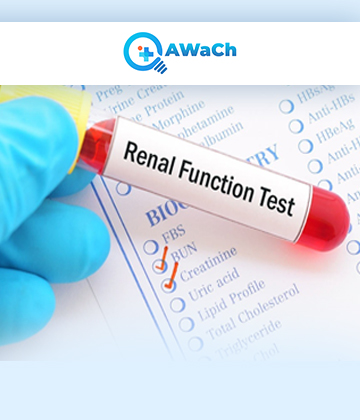Kidney Function Test
Healthcare professionals use kidney function tests as diagnostic tools to evaluate the health and functioning of the kidneys.
These tests offer crucial insights into the kidneys' performance, facilitating the detection of abnormalities and aiding in the diagnosis and monitoring of kidney diseases or injuries. including chronic kidney disease (CKD) and acute kidney injury (AKI). Commonly used kidney function tests are: Blood Urea Nitrogen (BUN) Test, Serum Creatinine Test, Glomerular Filtration Rate (GFR) Calculation, Urinalysis involves analysing a urine sample for presence of abnormal levels of protein, blood cells, glucose, or bacteria, Albumin-to-Creatinine Ratio (ACR) and Imaging Tests like ultrasound, CT scan, or MRI. It is important to note that these tests are typically used in combination to provide a comprehensive assessment of kidney function.Healthcare professionals, typically nephrologists, interpret these tests by considering the results within the framework of an individual's medical history, symptoms, and other factors. This approach ensures precise diagnosis and the development of a suitable treatment plan. Additionally, various non-renal parameters such as age, gender, and muscle mass can influence the outcomes of these tests.
What is Kideny Function Test ?
Kidney Function Test In addition to these conventional tests, which typically exhibit low sensitivity in detecting early kidney insult or injury, there exist newer biomarkers that offer heightened sensitivity and superior early detection capabilities for kidney insult. like Neutrophile gelatinase-associated lipocalin (NGAL) and cystatin C.
QAWaCh Bio a startup associated with IIT Bombay has developed a novel 10-minute, affordable quantitative point-of-care called ‘InstaNGAL®’ for early detection of AKI in critical care patients.
Healthcare professionals use Kidney Function Tests (KFTs), also known as renal function tests, to evaluate the health and efficiency of the kidneys. These laboratory tests offer crucial insights into the kidneys’ performance, their capacity to filter and remove waste products from the blood. The following outlines key components and details about kidney function tests:

Kidney Function Tests (KFTs), commonly known as renal function tests, serve as indispensable diagnostic tools in the realm of healthcare. These tests play a pivotal role in assessing the well-being and functionality of the kidneys. By scrutinizing various parameters, they enable healthcare professionals to detect irregularities, diagnose kidney conditions, and monitor kidney health over time.
These essential tests encompass a range of assessments, including the Blood Urea Nitrogen (BUN) Test, Serum Creatinine Test, Glomerular Filtration Rate (GFR) Calculation, Urinalysis, Albumin-to-Creatinine Ratio (ACR), and Imaging Tests such as ultrasound, CT scan, or MRI. It is worth noting that these tests are typically employed in combination to provide a comprehensive evaluation of kidney function. Nephrologists, experts in kidney health, interpret these results alongside a patient’s medical history, symptoms, and other pertinent factors, ensuring accurate diagnoses and tailored treatment plans. Furthermore, non-renal factors like age, gender, and muscle mass can influence the outcomes of these tests.
Strength:
Kidney Function Tests (KFTs) stand as robust diagnostic tools, offering profound insights into kidney performance. Additionally, they empower healthcare professionals to uncover kidney-related issues, including chronic kidney disease (CKD) and acute kidney injury (AKI), facilitating timely intervention and patient care. Moreover, these tests provide a holistic view of kidney health, incorporating both traditional assessments and newer biomarkers with enhanced sensitivity. Therefore, KFTs are indispensable for ensuring comprehensive renal health evaluations.
Advantages:
One of the primary advantages of Kidney Function Tests (KFTs) is their ability to detect kidney abnormalities at various stages, from early insults to advanced conditions. They are versatile in their application, assisting in the diagnosis and monitoring of a wide range of kidney disorders. Additionally, KFTs are cost-effective and readily accessible, making them an essential component of routine healthcare assessments. The inclusion of newer biomarkers like Neutrophil gelatinase-associated lipocalin (NGAL) and cystatin C further elevates the sensitivity and precision of these tests.
Recognitions:
Kidney Function Tests (KFTs) hold a prominent position in the field of healthcare diagnostics. They are universally acknowledged as vital tools for assessing kidney health and have gained recognition from healthcare professionals worldwide. Moreover, these tests play a pivotal role in the early detection and management of kidney diseases, earning accolades for their contribution to patient care.
Innovation:
Innovations in kidney function testing continue to evolve, with advancements like the 'InstaNGAL®' point-of-care test developed by QAWaCh Bio. This novel, affordable, and rapid test offers a groundbreaking solution for the early detection of acute kidney injury (AKI) in critical care patients. Such innovations underscore the commitment of the medical community to enhancing kidney function testing for improved patient outcomes.
